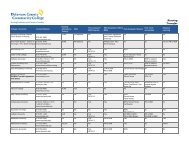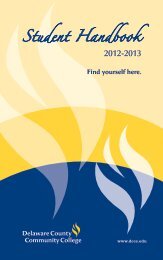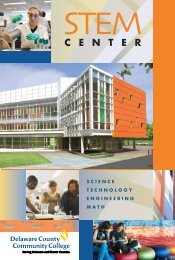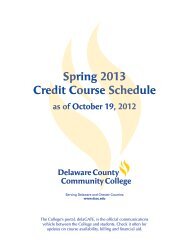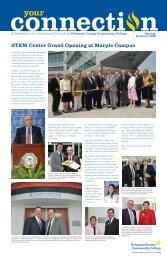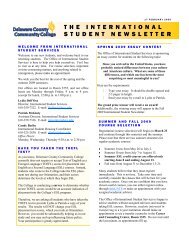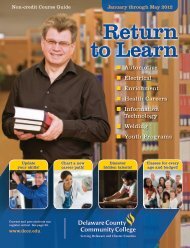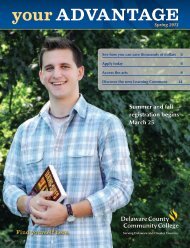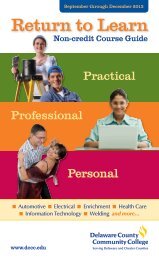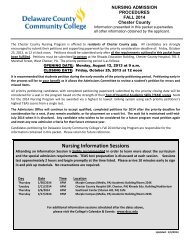2010 Catalog - Delaware County Community College
2010 Catalog - Delaware County Community College
2010 Catalog - Delaware County Community College
You also want an ePaper? Increase the reach of your titles
YUMPU automatically turns print PDFs into web optimized ePapers that Google loves.
92 COURSE DESCRIPTIONS<br />
Upon successful completion, should be able to:<br />
• Discuss the plant body and its modifications in the<br />
angiosperms.<br />
• Discuss the anatomical structure, origin, location and<br />
function of plant tissues in the angiosperms.<br />
• Explain the patterns of vegetative reproduction found in<br />
the angiosperms.<br />
• Describe flower, fruit and seed production in the<br />
angiosperms.<br />
• Describe the classification, characteristic life cycles and<br />
biological contributions in the thallophytes with<br />
chlorophyll (chlorophyta, cyanophyta, chrysophyta,<br />
pyrrhophytra, phaeophyta).<br />
• Describe the classifications, characteristic life cycles and<br />
biological contributions in the thallophytes without<br />
chlorophyll (eumycota).<br />
• Describe the characteristics, taxonomy, alteration of<br />
generations and evolution in the mosses, club mosses,<br />
horsetails and ferns<br />
• Describe the classification, characteristic life cycles and<br />
biological contribution in the gymnosperms.<br />
• Work independently in the laboratory by performing<br />
observations, drawings and dissections.<br />
Prereq. BIO 100 or BIO 111<br />
4 Credits 3 Weekly Lecture Hours<br />
2 Weekly Laboratory Hours<br />
BIO 220<br />
Nutrition and Well Being<br />
This course explores the principles of nutrition and their<br />
application to the establishment and maintenance of a<br />
person's well-being throughout his/her life. The course<br />
includes such concepts as dietary requirements, nutrient<br />
composition, food resources, metabolic processes, food<br />
additives, nutritional analysis and global considerations.<br />
Upon successful completion of this course, students<br />
should be able to:<br />
• Analyze the nutrient requirements for a healthy, balanced<br />
nutrition style.<br />
• Perform and interpret a computerized nutritional analysis.<br />
• Relate basic nutrients to various established<br />
dietary guidelines.<br />
• Interpret the effects of nutrient deficiencies and megadoses.<br />
• Relate nutrient resources to world hunger.<br />
• Describe the effect of the metabolic pathway on<br />
nutrient composition.<br />
Prereq. BIO 100 or BIO 110 or BIO 150<br />
3 Credits 3 Weekly Lecture Hours<br />
BIO 230<br />
Microbiology<br />
Microbiology is designed to examine the biology of<br />
microorganisms and their significance to human existence.<br />
Cellular structures, metabolic pathways and life strategies<br />
will be studied. The role of microorganisms in disease,<br />
genetic engineering, and the environment will be covered.<br />
This course is designed for students in the Science for the<br />
Health Professions and Natural Science curricula.<br />
Upon successful completion of this course, students<br />
should be able to:<br />
• Examine the evolutionary relationships between<br />
microorganisms and macroorganisms.<br />
• Describe the cellular biology of single-celled organisms.<br />
• Analyze the impact of microorganisms on humans.<br />
• Analyze the life strategies of various bacterial cells.<br />
• Apply the standard techniques for the study of<br />
microorganisms in the laboratory.<br />
• Apply standard laboratory skills to identify<br />
unknown bacteria.<br />
• Describe the properties of the genetic material in bacteria<br />
and viruses.<br />
• Explain the role of microorganisms in genetic engineering.<br />
• Examine the role of microorganisms in disease.<br />
• Describe the various strategies used for control of<br />
infectious disease.<br />
Prereq. BIO 110 and CHE 110 or BIO 150 and BIO 151<br />
4 Credits 3 Weekly Lecture Hours<br />
2 Weekly Laboratory Hours<br />
BUS 100<br />
(BUS) Business<br />
Introduction to Business<br />
This course introduces business and non-business majors<br />
to the business world. Emphasis is on terminology used in<br />
business. Students explore careers in business along with<br />
the events and economic conditions that affect business.<br />
Among the topics studied are the Business in a global<br />
environment, the various forms of business, the social<br />
responsibility of business and the functions of accounting,<br />
marketing, management, and human resource management.<br />
The role of technology in business is also explored.<br />
Upon successful completion of this course the student<br />
should be able to:<br />
• Explore the various careers in business.<br />
• Explain current events and economic conditions and how<br />
they influence business.<br />
• Compare and contrast the various forms of business.<br />
• Discuss the strategic role of marketing.<br />
• Explain the importance of ethical behavior, social<br />
responsibility and diversity in Business.<br />
• Investigate the uses of technology in business.<br />
• Explain the function of accounting and finance in the<br />
business decision-making process.<br />
• Discuss the functions of management.<br />
• Discuss the role of human resource management.<br />
• Define globalization and identify its impact on the<br />
business environment.<br />
Prereq. ENG 050, REA 050 and MAT 040<br />
3 Credits 3 Weekly Lecture Hours<br />
BUS 101 Introduction to<br />
International Business<br />
This course details practical terminology, concepts, associations,<br />
relationships and issues that are unique to business<br />
operations in the international sector. Its focus is on general<br />
consideration for businesses operating simultaneously<br />
in many different and constantly changing environments.<br />
Upon successful completion of the course, students<br />
should be able to:<br />
• Discuss the historical growth of international trade.<br />
• Distinguish between the major international trade theories.<br />
• Determine what types of trading assistance international<br />
organizations offer.<br />
• Explain the rationale for the international monetary<br />
system and how it affects exports/imports.<br />
• Assess the physical and political forces that shape the<br />
foreign environment.<br />
• Identify the necessary economic analyses that should be<br />
completed before trading or investing in another country.<br />
• Discuss the various export practices and procedures.<br />
• Examine East-West trade and its effect on economic<br />
relations.<br />
Prereq. ENG 050, MAT 040 and REA 050 or pass test<br />
3 Credits 3 Weekly Lecture Hours<br />
BUS 102<br />
Introduction to E-Commerce<br />
This introductory e-commerce course is designed to<br />
provide students with a basic understanding of what<br />
e-commerce is, how the Internet is changing the way<br />
business is conducted globally and how corporations are<br />
using the Internet to improve effectiveness of an organization's<br />
goals. The course defines e-commerce and related<br />
terminology, examines the relationship between consumers<br />
and business services on-line and looks at how business<br />
is conducted on the Web. Additional topics include what is<br />
involved in developing a Web site and an exploration of<br />
customer relationship management. The ethical, political<br />
and legal issues concerning proper conduct on the Internet<br />
are also discussed. The course is designed for students<br />
interested in electronic commerce and/or using computer<br />
technology in a business environment. It is a hands-on<br />
course using selected individual and team exercises on<br />
the Internet and other business computer technologies.<br />
Upon successful completion of this course, students<br />
should be able to:<br />
• Define e-commerce and related terminology.<br />
• Discuss the global impact of e-commerce.<br />
• Give examples of what businesses can gain from a<br />
presence on the Internet.<br />
• Identify how the Internet and e-commerce are affecting<br />
the structure and activities of organizations.<br />
• Identify different personal and business Internet<br />
Information Services on line.<br />
• Discuss ethical, political and legal issues concerning<br />
proper conduct on the Internet.<br />
• Identify different phases of doing business on the Web.<br />
• Explain the use of e-commerce in a business-to-business<br />
(B2B) setting.<br />
Give examples of how corporations are using the Internet<br />
to increase revenues and improve internal and external<br />
communications.<br />
• Demonstrate how e-commerce can improve the<br />
effectiveness of organizational goals.<br />
Prereq. ENG 050, REA 050, MAT 040 and DPR 100<br />
3 Credits 3 Weekly Lecture Hours<br />
BUS 105<br />
Introduction to<br />
Entepreneurship<br />
This class is an introduction entrepreneurial class for<br />
students interested in starting their own business. The<br />
ultimate goal of the class is to improve management,<br />
leadership, accounting and overall business skills and<br />
knowledge base for our entrepreneur students.<br />
Upon successful completion of this course, students<br />
should be able to:<br />
• Read and understand entrepreneurial terminology.<br />
• Take, analyze, and assess personal self-assessment<br />
indicators measuring personal qualities best suited to<br />
being an entrepreneur.<br />
• Define ethics and understand why ethics are important in<br />
small business.<br />
• Describe the different structures of business ownership.<br />
• Understand small business marketing, product and<br />
pricing strategies.<br />
• Understand and develop the use of SWOT analysis to<br />
identify strategic options. Review basic accounting<br />
practices that apply to entrepreneurship.<br />
• Understand the basic legal business environment that<br />
relates to small business. Learn how to conduct a<br />
feasibility study for an entrepreneurial business.<br />
Understand what it takes to be a successful entrepreneur.<br />
Prerequisites: Satisfactory score on the English and<br />
Reading placement test or successful completion of<br />
Developmental English (ENG 050) and Developmental<br />
Reading and Study Skills (REA 050).<br />
3 Credits 3 Weekly Lecture Hours<br />
BUS 106<br />
Entrepreneurship Seminar<br />
The main objective of this course is to provide the student<br />
with an understanding of the problems and challenges<br />
facing an entrepreneur in the process of creating a business<br />
plan and seeking investors. Students are required to write<br />
a business plan and formally present their business plan.<br />
To facilitate the writing of the business plan, the plan will<br />
be discussed and completed in sections. Multiple iterations<br />
of the business plan will be submitted for feedback<br />
and refinement.<br />
DELAWARE COUNTY COMMUNITY COLLEGE




